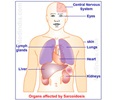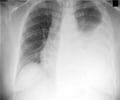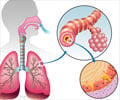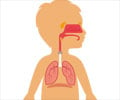Influenza
Influenza, commonly called the flu, is an acute, contagious, respiratory tract infection, which is caused by one of the influenza viruses. The severity of influenza symptoms depends on the type of influenza virus, and the age and health of the patient.
Influenza may produce no symptoms, mild-to severe symptoms, or fatal illness.
The common cold and influenza share many symptoms. However, colds are more likely to cause sneezing and a stuffy nose, while influenza is characterized by fever, coughs and muscle aches. Flu symptoms also develop rather suddenly, and are more severe. A person with influenza may experience chills, moderate to high fever (101o F to 103o) sore throat, runny nose, muscle and headaches, fatigue, cough, diarrhoea and dizziness.
The specific type of influenza is determined by the type of influenza virus (A, B, or C) that is causing the illness. Types A and B influenza viruses are responsible for epidemics that occur especially in winter.
Type C influenza does not cause epidemics, and it usually produces only a mild infection. Persons with Type C influenza may, or may not, display and symptoms. Over time, influenza viruses constantly change, by mutation. Mutations cause subtle alterations in the influenza virus that allow it to evade the human body's immune defences formed from previous influenza encounters. This helps to explain why individuals are susceptible to recurring bouts of influenza throughout life.
Although the influenza virus primarily affects the respiratory system, it may also affect the musculoskeletal, nervous, and gastrointestinal systems. The doctor conducts blood tests, sputum cultures or chest X-rays to determine whether you have influenza or not. Patients infected with the flu may have symptoms ranging from up to 24 hours to two weeks.
Individuals who are at a high risk for influenza should receive the influenza vaccine every year. It is 90 per cent effective in helping healthy persons under age 65 avoid or lessen the severity of influenza. Those at high risk include people who are 65 plus, people suffering form chronic illnesses of the heart, lung, or kidneys, diabetics and people with severe forms of anaemia. Those who are suffering from illnesses that lower immune defences are at great risk, too. During epidemics, physicians can prescribe antibiotics to high-risk individuals which will lessen the chance of them acquiring influenza. Frequent hand washing helps to do away with the influenza virus, which is often spread through direct contact.
Two prescription antiviral drugs, rimantadine and amantadine are available to stop the influenza virus A from replicating in the body. These medications usually lessen the severity and duration of an influenza infection, but only if they are administered within the first 48 hours of illness. You must seek medical attention promptly if your fever or cough worsens; you are coughing up blood or thick, foul-smelling mucus; you have chest pain or shortness of breath; you develop an earache.
Although most patients recover fully from the flu, some develop serious, potentially life-threatening complications.


























